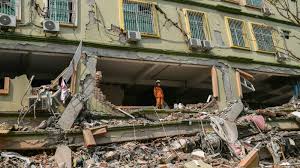Aid workers condemn violence against migrants in Bulgaria

Sofia: Sleeping in parks, mistreatment in prisons, beatings and shots at the border: aid workers sharply criticize the situation for refugees and migrants in Bulgaria as Germany looks to up deportations to the country.
Refugee aid workers have criticized serious violence against people seeking protection at the Bulgarian border and in prisons in the country.
The conditions in the country’s largest refugee camp, Harmanli, are also catastrophic, said the chairman of the Nuremberg-based association Matteo – Kirche und Asyl, Stephan Reichel, in an interview with the German TAZ paper on Thursday (October 31).
In September, he visited Bulgaria to assess the situation of refugees, accompanied by a group of aid workers and experts from the field of church asylum. At the border, people seeking protection have to undress, they are beaten, robbed and sometimes even shot, he claimed.
Speaking to TAZ, Reichel explained that asylum seekers in Bulgaria face limited job opportunities and dire living conditions. Many lack legal employment options and rely on aid from family members abroad. He noted that while there are similar issues in countries like Hungary and Poland, conditions can vary. Some countries like Romania have improved, while Italy refuses to accept deportees, citing a national emergency.
Following the recent attack in the town of Solingen by a man who had been scheduled for deportation to Bulgaria last year, there have been calls by opposition politicians for stricter deportation policies to Bulgaria and other Schengen countries.
However, Reichel disagrees, asserting that such arguments are unfounded and lack factual basis. Under the Dublin Agreement, countries can refuse deportations on humanitarian grounds and he argues that Germany should reconsider deportations to Bulgaria, given the documented human rights abuses in the country.
The border between Bulgaria and Turkey continues to see numerous pushbacks, with reports of violence used by Bulgarian border guards against migrants. Incidents include migrants being forced to swim back to Turkey, stripped of their clothing, and attacked by police dogs.
In July 2024, an internal report from the EU border agency Frontex, which was revealed by the EU Observer, highlighted these violent pushbacks, which have been condemned by NGOs. Investigations, including those by the Balkan Investigative Reporting Network (BIRN), confirm that Frontex is aware of the increasing incidents.
Dutch MEP, Tineke Strik, responded to the allegations: “The modus operandi of the Bulgarian border police follows a pattern that we witness all over the EU’s external borders: Frontex officers are being kept out of critical areas or pressured not to report violations, so national authorities can push people back and the EU can pretend not to know.”
She added: “The EU and Frontex cannot remain complicit, and have a responsibility to end these practices, by freezing funding and halting Frontex support, in accordance with their legal obligations.”
A report from Bulgaria’s Ministry of the Interior noted 10,041 cases of migrants being returned to the interior of a neighboring country from January to April 2024, indicating a high level of pushbacks.
In 2023, 48 percent of asylum seekers (16,211 out of 33,703 applicants) in Bulgaria abandoned their asylum procedure and absconded, a minor increase (2 percent) from the previous year. This is mainly due to the significant length of the procedures, low recognition rates for certain nationalities and poor living conditions in reception centers.
Asylum seekers who are sent from Germany to Bulgaria under the Dublin regulation and whose application for protection has already been rejected in Bulgaria are sent directly to a special deportation prison, according to Reichel.
Depending on their country of origin, the individual is then deported immediately or remains in the prison for up to 18 months, “in some cases even longer”. In these prisons, severe abuse is often the order of the day. Other, already registered refugees are “simply sent away” after their return to Bulgaria and many ended up on the streets and sleeping in parks.
Reichel criticized the Federal Office for Migration and Refugees for arguing that everything in Bulgaria was within the framework of ‘normal’ police violence. “If Germany thinks that’s okay, the relevant authorities in Bulgaria will naturally think it’s even more okay.”
Germany should take over the procedure for asylum seekers in so-called Dublin cases, Reichel argued, even though Bulgaria is actually responsible for the asylum procedure in these cases. He stated that deportation for humanitarian reasons is out of the question and that it is obvious that “a constitutional state, which Germany should still be, should draw this conclusion.”





